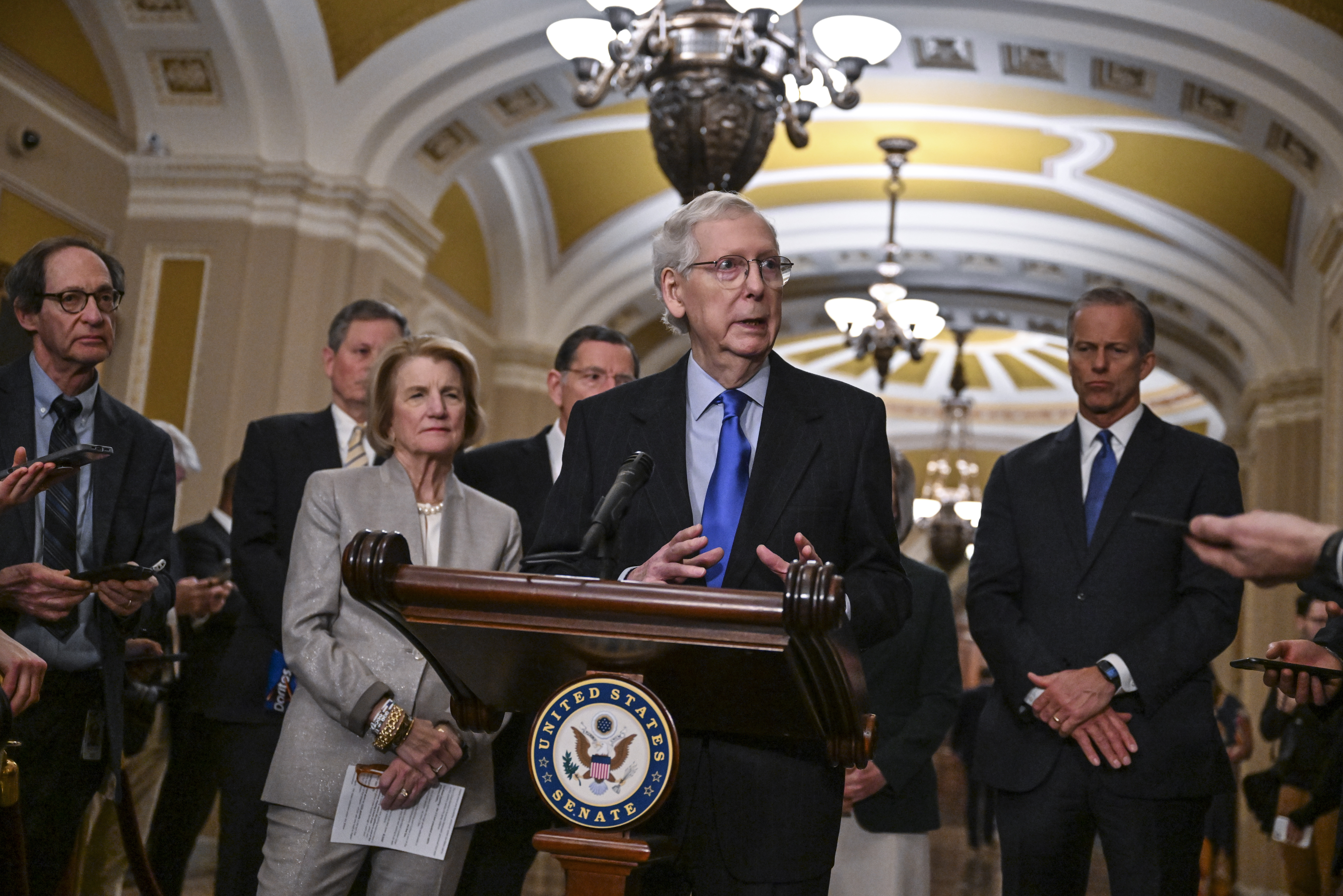Judges, GOP lawmakers slam new policy that limits 'judge shopping'

Senate Minority Leader Mitch McConnell (R-Ky.) speaks to the media following a Senate Policy Luncheon at the U.S. Capitol on Tuesday in Washington, D.C. (Ricky Carioti/The Washington Post)
In letters sent to about a dozen chief judges across the country, Senate Minority Leader Mitch McConnell (R-Ky.)—joined by Republican Sens. John Cornyn (Tex.) and Thom Tillis (N.C.)—urged the judges to continue their current case assignment practices, noting: “Judicial Conference policy is not legislation.”
They were responding to an announcement Tuesday by the Judicial Conference of the United States, the policymaking body for the federal courts.
Judicial Conference officials have not yet released their new policy to the public, and a spokesman declined to comment when asked whether the conference has the authority to make the change.
On Tuesday, the conference said cases with statewide or national implications can no longer be automatically filed in single-judge divisions and assigned to the judges who preside there. Such divisions exist in rural parts of the country where courthouses are spaced very far apart.
District courts may continue to assign cases to a single-judge division if those cases don’t seek to bar or mandate state or federal actions through declaratory judgment or injunctive relief, the judicial conference said. When random assignments are required, the case will be assigned to a judge within the same judicial district.
Officials said they were trying to address widespread concerns about “judge shopping”—or filing a lawsuit in a courthouse where the lone judge is known or suspected to be sympathetic to a particular cause.
But their decision has sparked strong opposition from conservative lawmakers and judges, and also questions from legal experts about who controls such decisions.
The judge-shopping issue gained national attention after antiabortion activists filed a lawsuit seeking to revoke federal approval of the abortion medication mifepristone in a division with just one judge: Matthew J. Kacsmaryk, known for his long-held antiabortion beliefs. Kacsmaryk revoked federal approval of the drug. The U.S. Court of Appeals for the 5th Circuit narrowed his ruling, and the case is now pending before the Supreme Court.
The Biden administration and organizations such as the American Bar Association have raised concerns about judge shopping in the past, and Chief Justice John G. Roberts Jr. also highlighted in the issue in his 2021 Year End Report on the Federal Judiciary.
Senate Majority Leader Charles E. Schumer (D-N.Y.) has led a year-long effort to get the conference to end its case assignment system, which he has said allows individuals to select a preferred judge to hear the case.
“The practice of judge shopping has given MAGA-right plaintiffs the ability to hijack and circumvent our federal judiciary by targeting courts that would all but guarantee a handpicked MAGA-right judge who would rule in their favor,” Schumer said in a statement praising the action by the judicial conference.
But McConnell, in his letter to the chief judges Thursday, wrote that neither Schumer nor the conference have the authority to tell the courts how to assign cases.
“It’s not our place to opine on how best you should manage the caseload of your court. Neither is it Senator Schumer’s place, for that matter,” McConnell wrote.
“It is your job to manage the caseload of your court according to the dictates of local circumstances and convention,” the letter continues. “We therefore hope and expect that you will continue to do what is in the interest of justice for litigants in your jurisdiction without regard to partisan battles in Washington, D.C. If at any time current law is insufficient to meet the needs of justice, you can be assured that Congress - and not the Judicial Conference - will make the relevant changes.”
In a statement, Chief Judge Randy Crane of the Southern District of Texas said the policy violates the federal statute 28 USC 137, which “leaves the assignment of cases to the chief judges of each court.”
“Suggestions of the Judicial Council can’t override that law,” Crane said.
Russell Wheeler, a judicial expert at the Brookings Institution, also questioned whether the conference has the authority to mandate that the courts amend their case assignment practices. Wheeler said circuit councils, which oversee the circuit courts, have the power to issue orders - not the Judicial Conference.
“I don’t know where the conference gets that authority,” Wheeler said.
Judges James Ho and Edith Jones of the U.S. Court of Appeals for the 5th Circuit said the policy was the result of political pressure.
“Judges are supposed to follow the laws enacted by Congress, not bend the rules in response to political pressure,” Ho said in a statement.
U.S. District Judge Alia Moses of the Western District of Texas raised separate concerns about how the policy would be executed. Moses, who is the chief judge of that district, said judges will need to take time out of their day to travel to new venues to hear cases, time that could be spent tackling their full dockets.
“I am in the Del Rio Division. We do not have airline service. If I am assigned a matter in any one of our divisions, I must travel by vehicle,” Moses said. “The closest other courthouse to me is in San Antonio, which is about 150 miles away. Traveling to any other division would be at least a 2 to 3 day trip. This incredibly impacts my current Del Rio docket, which has over 3000 criminal cases on the docket.”



